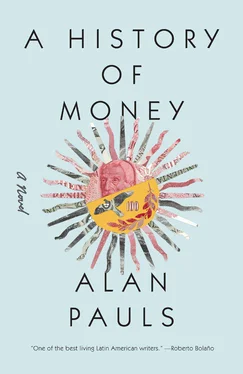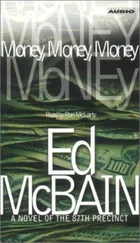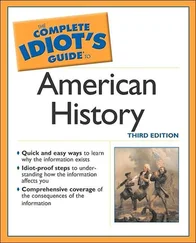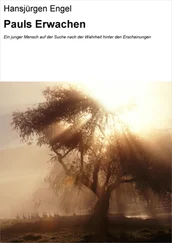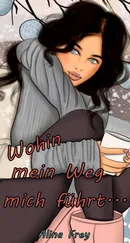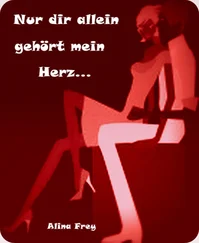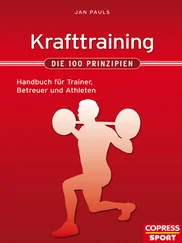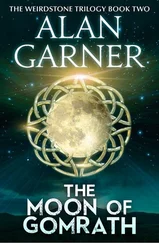Meanwhile, he has to wash his hands every time he handles money. When he’s at the zoo, for example, on one of the sessions of animal observation and sketching that often fill his Saturday mornings. He decides to buy a packet of the little cookies for animals, in the shape of animals, that are his downfall, and which he usually finishes in the blink of an eye, first the bears, his favorites, then the monkeys, the tapirs, the crocodiles, and so on, until the bottom of the packet is a morgue full of horrifying stumps: an elephant’s trunk, a pecarí ’s hoof, the spiral tail of a pig. For a moment he feels like he’s taken a terrifyingly bold step, like crossing a frontier from which nobody ever returns, or at least not in the same form they left in. He asks himself what will become of a boy fed on cookies for animals in the shape of animals. And while he’s thinking about it, he puts the change from the cookies in a pocket — the route varies, as do the animals he sketches, but the one rule on every visit to the zoo is the agreement he has with his father, who goes with him, that he pays for everything he eats there himself, with his own money — and returns to the enormous, exhausting white page he’s just spread out on top of his drawing case. He’s only just begun to trace the softly curved rump of the zebra in front of him when he’s ambushed by a trio of black fingerprints, stamped on the heart of that dazzling whiteness like a depraved wellspring. Day ruined. He puts his pencil down and looks desolately at his fingers, the tips dirty from touching the notes, a few lone crumbs stuck to the slightly sticky skin like forgotten mountain climbers on a pink slope. Then he rips the paper in one brutal movement, crosses his arms while falling to the ground, and buries himself in one of his gloomy, bad-tempered trances, which can last for hours, or days, and from which nobody knows how to rescue him.
How his father does it, he doesn’t know, he’ll never know. He certainly takes good care of his hands. He washes them frequently no matter where he is, but particularly at the office, and always with his own soap, which he keeps in the second drawer of his desk and takes into the bathroom with him, where he scrubs them furiously and joyfully; and he files his nails — including the cubist one, which he caught in the drawer of a steel file cabinet when he was a young boy, so that now it looks like a pitched roof, one side black, the other white with a hint of pink, split down the middle by a sharp white line — with a dedication that couldn’t be further from his treatment of his toenails, which he surrenders to an unchecked growth that always ends up ruining his socks. But it can’t be just that. It’d be easier to understand if he dealt in checks, promissory notes, credit cards, any of those sanitized substitutes for money that are beginning to come into use at the time, the task force of an arrogant, cutting-edge economy, which he sees members of his stepfamily already juggling familiarly, particularly his mother’s husband, whose checkbook covers are tattooed with the same beautiful uppercase initials that appear on the haunches of the cattle grazing on his land to the south of the city. But his father is cash, a hundred percent. Of course, he’s familiar with all the modern forms of payment, because of his work, and because he doesn’t live in a cave, but he’s very careful to use them and treat them with the same aristocratic disdain with which he condemns calculators and, a few decades later, when they wouldn’t do him any harm, glasses, hearing aids, and walking sticks.
Always the wad of notes. No matter where he is, whether on the street or playing tennis, on a layover in Dakar airport or getting up from his TV chair — his true place in the world, in his final years — to fetch his perennial divorcé’s dinner of roast chicken and potatoes, which he orders from the deli on the corner, he always seems to have his money within arm’s reach. All of his money, which of course includes the pounds, Swiss francs, dollars, and lire with which he usually impresses the delivery boy, holding the wad right under his nose to select the notes he’ll use to pay him. The question is how to tell, in light of this law of cash, the single, ironclad axiom that rules his economy from beginning to end, whether his father is rich or poor. It’s a question that will never cease to confuse him. The size of the wad, its arrogant bulge, the variety of denominations and colors it comprises, even its organizing principle: all of this seems to be a sign of wealth, of the wealthiest of wealths, direct, immediate wealth, which doesn’t need to be translated or converted or passed through an intermediary before it can be put to use. But whenever he catches his father taking the wad from a pocket to pay for something, anything, two cinema tickets, a pair of sneakers, a small tub of ice cream, twenty-eight nights at the Croatian hotel in Villa Gesell, which nevertheless are so sublime that to him they’re priceless, and allows himself to marvel at the idea that this bundle of notes, which his father handles as masterfully as a cardsharp, as though he’d been born with it in his hand, is in fact all his money, there comes a moment when the spell stands still, as though lashed with a malevolent whip, and what appears after it’s dispersed is its flip side of doubt and suspicion: the terror — arising precisely from the evidence that what he sees there is it, that there’s nothing more — that it might run out, run out completely, with no chance of being replaced, once and for all.
But if he had any idea about anything, he’d understand that the amount doesn’t matter. The fact that his father always has all his money to hand doesn’t make him rich or poor. It makes him ready. It’s simple: his father is prepared. He can do what he likes whenever he likes, buy what he likes, go where he likes. Rich or poor, he’s free. The idea is too abstract — reckless, even — for a boy of six, which might explain its fate in his imagination: it spends years hibernating in a dark, remote limbo, along with other ideas that brush by him sometimes but never really reach him, as though they never quite believe him worthy of themselves, and so keep their distance, tempting him and contemplating him but remaining as far from his reach as any other wonder of the adult world, like shaving, for example, or knowing all the streets in a city. Until the day he finds out that Sartre — who’s described as the ugliest philosopher in the world, according to the person who entrusts this fact to him — boasts that he carries everything he needs in order to survive in his coat pockets — money, obviously, but also tobacco; a notebook and something to write with; a penknife; a small, difficult book; and a spare pair of glasses — and the idea is reawakened and fills his head with a blinding clarity.
Free, yes, but free to do what? Probably to vanish into thin air from one day to the next, without giving any warning or leaving any clues, just as his mother — hoping to open his eyes once and for all, she says — tells him his father’s father did: a true founder of the school of family escapology who, incapable even of coming up with a remotely original excuse, announces in his shirtsleeves one day that he’s going to the corner to buy cigarettes and never comes back, only sending a sign of life two years later, from the hotel he’s lording it over with a Spanish woman in a new, still unfinished resort on the Costa del Sol, one of those paradises for enterprising tourists where the sky, judging by the photo on the postcard that arrives at the house with no envelope, with the postmark stamped directly on the fugitive’s handwriting and the unbearable indignity of its revelations on show, is a fluorescent cyan, and an army of palm trees guards the sunbathers while they lie on the sand.
Читать дальше
